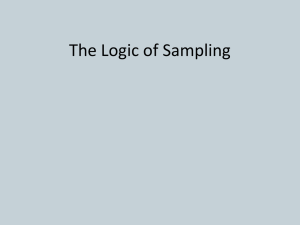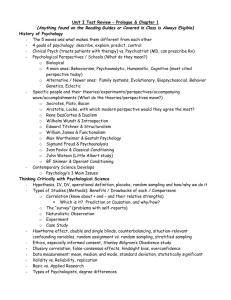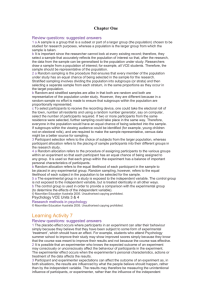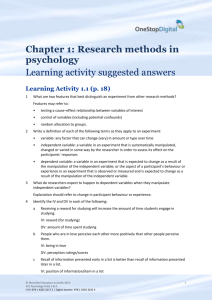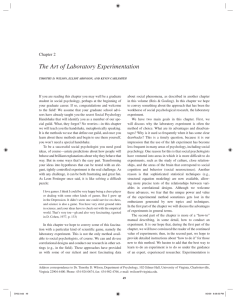Psychology Research Methods Worksheet
advertisement
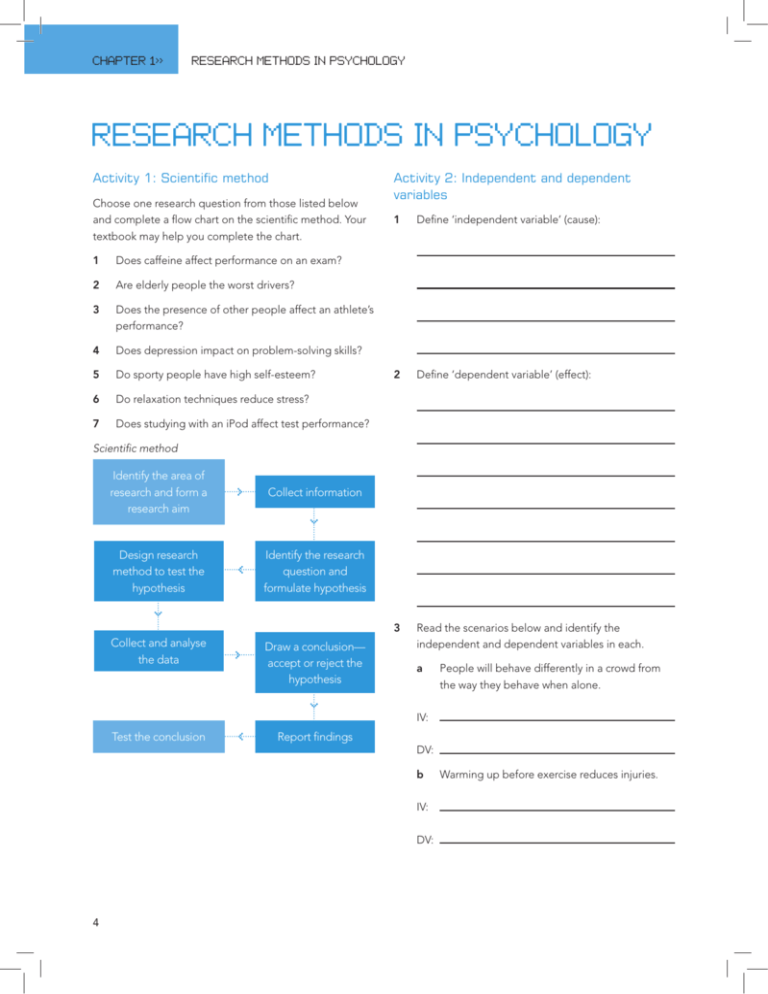
chapter 1>> research methods in psychology research methods in psychology Activity 1: Scientific method Choose one research question from those listed below and complete a flow chart on the scientific method. Your textbook may help you complete the chart. Activity 2: Independent and dependent variables 1 Define ‘independent variable’ (cause): 1 Does caffeine affect performance on an exam? 2 Are elderly people the worst drivers? 3 Does the presence of other people affect an athlete’s performance? 4 Does depression impact on problem-solving skills? 5 Do sporty people have high self-esteem? 2 6 Do relaxation techniques reduce stress? 7 Does studying with an iPod affect test performance? Define ‘dependent variable’ (effect): Scientific method Identify the area of research and form a research aim Collect information Design research method to test the hypothesis Identify the research question and formulate hypothesis 3 Collect and analyse the data Draw a conclusion— accept or reject the hypothesis Read the scenarios below and identify the independent and dependent variables in each. a People will behave differently in a crowd from the way they behave when alone. IV: Test the conclusion Report findings DV: b IV: DV: 4 Warming up before exercise reduces injuries. c c Aggressive play increases with age. 200 male VCE students who play sport after school IV: Population: DV: d d Text messaging while driving causes accidents. IV: Population: e DV: e Drinking energy drinks increases your sports performance. 350 IT workers with memory problems Population: 2 IV: Look at the scenarios below and create or determine a likely sample. DV: a f Practising goal kicking improves accuracy. b DV: g c d Parents with high IQs will have children with high IQs. People who fear spiders will also fear snakes. Sample: e IV: DV: Six-year-old girls who play with dolls will have difficulties establishing friendships. Sample: Activity 3: Population and samples Look at the scenarios below and identify a likely population. 50 VCE Psychology students from the local high school Population: b Adults with schizophrenia will have impaired memory abilities. Sample: DV: a Blue-eyed females have a lower IQ. Sample: Sleep deprivation causes stress. IV: h Four-year-old boys who drink cordial will be aggressive. Sample: IV: 1 400 mothers who have children under five years of age, with allergies 120 male adults diagnosed with depression who live in Victoria Population: Activity 4: Sampling procedures 1 Define the term ‘sample’: 5 chapter 1>> 2 research methods in psychology Three sampling techniques used for participant selection are random sampling, stratified sampling and convenience sampling. Complete the table below on each. Technique Explanation Advantage Disadvantage Random sampling Stratified sampling Convenience sampling Activity 5: Control and experimental groups 1 What is an experimental group? What is its purpose? What is meant by random allocation? 4 2 3 What is a control group? What is its purpose? Look at the scenarios below and identify the experimental group and the control group. a Experimental: Control: b Students who listen to music while studying will perform better on an exam than those students who do not listen to music. Males who have many friends on Facebook will have lower self-esteem compared with those males with fewer friends. Experimental: Control: 6 c Girls who shop for five hours will have more friends than girls who shop for less than five hours. Experimental: Control: d Younger teachers will have better IT skills than those teachers who are over 35 years of age. Experimental: Activity 6: Scales of measurement Using your textbook, look at each scenario below and identify the type of data it is: nominal, ordinal, interval or ratio. Place a tick in the appropriate box. Scenario Nominal Ordinal Interval Ratio Eye colour Temperature Height of the students in class Control: e People who read seven or more hours per week will perform better on a comprehension test compared with those who do not read. Experimental: Control: f Older adults who eat three or more pieces of fruit each day will have better memory abilities than those who do not eat fruit. Experimental: Control: Soccer ladder Reaction time Score on your driving test Long jump results from the class Placing in a karate competition Altitude Activity 7: Descriptive statistics Nursing is a highly stressful job. Below are the data for the number of days 30 nurses take off each year. 5, 2, 7, 7, 3, 5, 8, 10, 5, 6, 2, 4, 8, 9, 6, 10, 6, 5, 2, 4, 7, 9, 3, 2, 5, 6, 8, 1, 9, 3 1 Using the data above create a frequency distribution. 7 chapter 1>> research methods in psychology 2 Create a histogram for the data above. 3 Calculate the mean for this data. Activity 8: Inferential statistics 1 2 4 Calculate the median for this data. 3 8 Calculate the mode for this data. What is meant by p-value? 5 What are inferential statistics? What p-value do psychologists tend to use to indicate statistical significance? What does this mean? 4 The following p-values were found in research. Determine which are statistically significant (SS) and which are not (NS) when p=0.05. a p=.06 b p=.003 c p=.02 d p=.10 e p=.70 f p=.08 g p=.005 Activity 9: Correlation 3 Look at the following studies and determine if there would be a positive or a negative correlation. 1 The more energy drinks a swimmer drinks the faster he or she swims. Adults who drink four or more alcoholic beverages will have a lower score on a memory test. 4 The more people interact with different cultural groups the lower the number of racist incidents. 2 People who have seven or more hours of sleep will perform better on a driving test. 5 The more vitamin B a person consumes the higher their intelligence. Activity 10: Ethical considerations in psychological research Using your textbook, complete the table below, outlining the code of ethics published by the Australian Psychological Society. Ethics Explanation 9 chapter 1>> research methods in psychology Activity 11: Review questions 1 6 List the three different experimental designs psychologists can use for research. What is a variable? 7 2 What is the difference between independent and dependent variables? What is the placebo effect? How can it be eliminated? Explain. 3 What is a hypothesis? 8 4 What is an extraneous variable? 5 What is the experimenter effect? How can it be eliminated? Explain. In what way are participants allocated to groups in psychological research? Explain. 9 10 What is the difference between qualitative and quantitative data? Provide an example of each. 10 Why are reliability and validity important in psychological research? 2 11 What is the difference between descriptive and inferential statistics? 3 12 When data is plotted on a graph, a psychologist often will see a skew in the graph. Explain the types of skewed graphs that a psychologist may see. 4 David decided to conduct a study on the VCE Psychology students at his school. He wanted a sample, so he placed all the names of the VCE students in a hat and drew out the first 50 to be his participants. a stratified b confounded c random d independent Mr C. Lown decided to conduct a study on the effects of music on memory. He asked his music class to study for two hours each night with music playing. After the first week he tested them on a memory test. In the second week he asked the same students to study two hours each night but with no music. Again at the end of the week he tested them on a memory test. This is an example of a experimental design. a independent groups b repeated measures c random d convenience The experimenter effect refers to: a the participant’s behaviour being influenced by their expectation of how they should behave b the participant’s behaviour being influenced by the other participants in the room c the experimenter’s behaviour in conducting research d the outcome of the experiment being unintentionally influenced by the experimenter. Activity 12: Multiple choice questions 1 In research the variable is deliberately manipulated and the variable is measured. a extraneous; dependent b independent; dependent c dependent; independent d independent; extraneous 5 To eliminate the experimenter effect it is best to use: a a double blind procedure b a single blind procedure c counterbalancing d either a or b. 11 chapter 1>> 6 7 8 9 research methods in psychology Tony conducted research on the benefits of school uniforms. He asked 100 students and 30 teachers from his school to give their opinion on school uniform. This is an example of: a qualitative and subjective data b quantitative and subjective data c subjective and objective data d qualitative and objective data. Sometimes researchers go to kindergartens or day care centres to conduct research on children. Often they just observe their behaviours. This type of data collection is known as a/an: a controlled observation b interview c naturalistic observation d questionnaire. Researchers have been conducting studies on the impact of divorce on children. They have been following the lives of 100 children over 15 years. This is an example of: a interviews b a cross-sectional study c questionnaires d a longitudinal study. Test-retest reliability refers to: a a test being checked to ensure that it produces the same result if readministered to the same person under the same conditions b a test being administered to several different people to check that it is accurate c whether a test item measures what it is supposed to measure d whether the test can be used to support the theory. 10 Measures of central tendency show: a 12 how the data are central to research b how the data are clustered near the central point of the dataset c how the data are represented in graphs d all of the above. 11 A generalisation is: a the final decision about what the results mean b a judgment about the sample c a judgment about the results and central tendencies d a judgment about the extent to which the research findings can be applied to the population represented by the sample. 12 A correlational study was conducted to study the effects of TV on children. It was hypothesised that children who watch three hours of TV will perform poorly on tests. It is likely that researchers will see a correlation. a positive b bimodal c negative d dependent 13 Mr B. Ored wants to conduct research on the children in his school. In order to do this he needs to consider all psychological ethics. Because the children are under 18 he must obtain: a withdrawal rights b debriefing c parental informed consent d psychological harm. 14 While conducting his research Mr B. Ored discovers that several of his participants want to leave the experiment and take their data with them. The participants are exercising: a informed consent b withdrawal rights c deception d voluntary participation.





